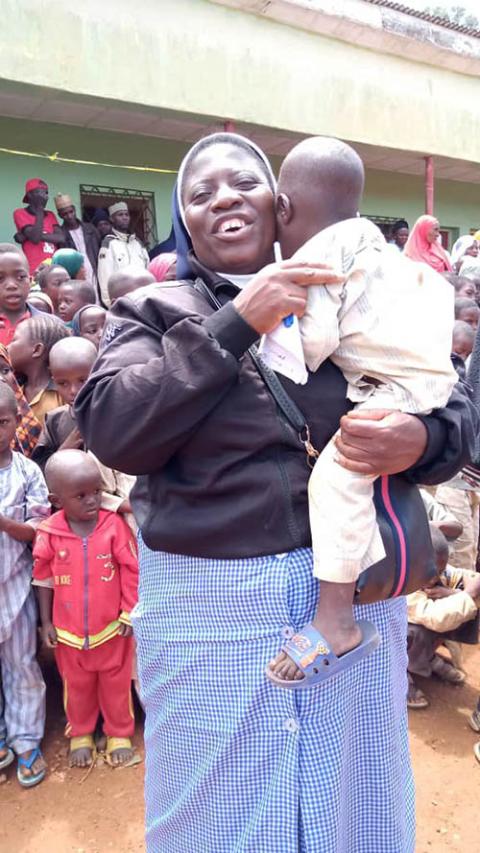
Author Mary Nyuylem holds a child from Cameroon (Provided photo)
The increasing number of refugees pouring into this part of Nigeria where we work is a sign of the ongoing burning of homes, killings, kidnappings, destruction and seizure of private property, and general insecurity in the two Anglophone regions of Cameroon.
I am a Tertiary Sister of Saint Francis, or TSSF, and in February 2019, I received the blessing from my provincial superior, Sr. Roberta Feh, to contribute my energy and skills to respond to the needs of this "new" mission in our province. In fact, the Conference of Religious of the Ecclesiastical Province of Bamenda, or CREPB, had launched the call for volunteers to assist in the refugee communities in Nigeria, and I opted to do that.
Since the beginning of this mission by CREPB, 21 religious from Cameroon have taken turns volunteering in these communities, but for the past six months, just two religious sisters have been there. We work with 25 communities in Taraba State; 17 in Cross River State; three in Akwa Ibom State; and one in Benue State. These settlements host more than 35,000 displaced women, men and children from the invaded Anglophone Cameroon.
The displaced people spend their days doing chores like cooking, gardening, babysitting and various paid jobs for settlers around the villages. Though living in nostalgia and frustration, this lifestyle becomes "normal" if they are healthy and can eke out a living by personal effort or from donations.
Illness brings them to a higher level of suffering. Donated medications are the solace we can offer, but when sickness becomes serious, requiring hospitalization, complications of funding set in since health care financing here is completely out of pocket. Unfortunately, complicated sicknesses are generated here by the poor living conditions.
Because the needs of the refugees are enormous, our normal days get very busy. We seek funding from charitable people and groups for their nutritional needs, with which we purchase and distribute food to the residents in the various camps; provide medical assistance through primary care or referrals to other hospitals; provide psychospiritual support; assist them in skill-building to empower them to take up livelihood programs; and provide basic relief needs like clothes. Since some of the needs are far beyond our professional and material abilities to provide, we find some volunteers from among the displaced persons to assist in training others.
Advertisement
Many of the displaced do appreciate our presence and assistance in poverty-alleviation initiatives, health activities and "lighting their hope." Regrettably, the volunteers are quite few, considering the population and their needs.
In places the resources have been donated by the Conference of Religious for the Ecclesiastical Province of Bamenda; the Conference of Major Superiors of Cameroon; people of good will; Cameroonians in diaspora; Manus Unidas; the Franciscan Sisters of Perpetual Adoration (USA); the Sisters of St. Francis of Assisi (USA); and individual donors, both lay and ecclesiastic. We remain very grateful and continue to count on their support.
The duration of this service depends on the end of the war in Anglophone Cameroon. In the meantime, the people depend on us to provide what they need to live a normal life; besides financial assistance for their needs, we must have a four-wheel drive to take us to the various communities. They need school supplies, tuition for the children of school age and opportunities to build skills for the youth in various trades such as sewing, knitting, carpentry and agriculture. This is the only way we can guarantee a future for them.
What will happen to this help as the COVID-19 threatens a complete shutdown of the world?
Globally, the Tertiary Sisters of St. Francis have embraced this ministry in line with our mission "to be an empowering presence through everything they do"; and according to our charism: "to live contemplatively as apostolic religious so as to recognize the will of God in the signs and needs of the times."
Current Provincial Superior Sr. Gloria Wirba Kenyuyfon confirms that "this sign of the times is so glaring that it could not pass us by unattended, and we are committed to the continuation of this mission."
Despite the growing challenges, I find the mission fulfilling because it was a heartfelt call. Additionally, in October 2019‚ the month of missions, the theme "baptized and sent" inspired and motivated me to put into words my own goal: "I am baptized and sent to be an empowering presence in this part of the world in response to the needs and signs of the times."
[Mengnjo Mary Nyuylem is from Bamkika’ai, Kumbo (Cameroon). She is a member of the Tertiary Sisters of St. Francis. She works in Nigeria with displaced persons from Cameroon.]




